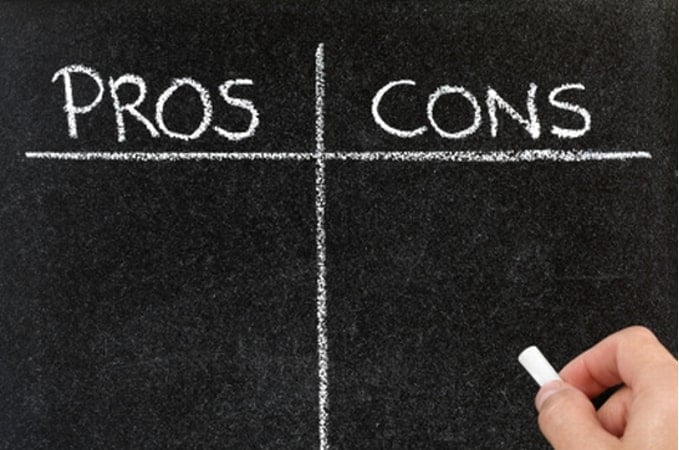Among those who want to get divorced amicably, collaborative divorce is all the rage. It keeps you out of court, prevents your private affairs from becoming a public spectacle, and is a “kinder and gentler” way to divorce. But, it doesn’t work for everyone. The question is: will the Collaborative Divorce Process work for you?
Before you can answer that question, you have to understand what Collaborative Divorce is … and what it’s not.
What is a Collaborative Divorce?

Collaborative Divorce is not just "a divorce that's collaborative." It is an entirely different divorce process than the one most people know.
Collaborative Divorce is a voluntary, out-of-court dispute resolution process. Using this process, divorcing couples work to resolve their issues in a conference room rather than a court room.
The Collaborative Divorce Process redirects a couple from focusing on “winning” their divorce to focusing on creating a settlement that meets both of their needs, and the needs of their children. It also respects both parties’ concerns.
Instead of amping up everyone’s fears, Collaborative Divorce professionals work to keep everyone’s emotions in check.
In most places, the Collaborative Divorce Process uses a team of specially trained divorce professionals to help guide a couple through their divorce as efficiently and effectively as possible. The Collaborative Divorce Team includes at least two collaborative divorce attorneys. It also may contain a neutral financial professional, one or two divorce coaches, and a child specialist.
The number of professionals who are on any Collaborative Team depends upon the divorcing couple’s needs and circumstances. It also depends on the culture of the divorce professionals in your area.
For example, in a Chicago Collaborative Divorce it is customary to have at least two attorneys, a financial neutral and a divorce coach in every Collaborative Divorce case. In other places, or in complex cases, a couple may need to get two divorce coaches and a child specialist as well.
What Collaborative Divorce is NOT
While couples using the Collaborative Divorce Process work to resolve their issues amicably and respectfully, it is WORK! It’s not like everyone sits around holding hands and singing “Kumbaya” at every meeting. Tempers flare and emotions can run high. Conflict happens.
The difference between a Collaborative Divorce and a litigated divorce is NOT that a Collaborative Divorce has no conflict. The difference is in the way a divorcing couple handles the conflicts that arise.
In litigation, screaming couples and their agitated lawyers argue about their issues in court. Then a judge tells them what to do.
In Collaborative Divorce, emotional couples and their lawyers discuss their issues in a conference room while a divorce coach does his/her best to keep everyone focused and calm. Eventually, the couple figures out what they want to do.

What Makes Collaborative Divorce Different?
One thing separates collaborative divorce from everything else: a “participation agreement.” That is a written agreement that everyone including the divorce professionals signs that says, in essence, “We agree to work together to resolve this case amicably and to stay out of court.” If anyone decides to bail on the collaborative process and go to court, all of the professionals withdraw and the couple has to start all over again with brand new lawyers.
What?!!! How does THAT work?
Actually, this works surprisingly well. Everyone knows the rules of the Collaborative Process from the start. Everyone knows that if you decide to start fighting in court, the case as they know it is over. So, everyone has an incentive to stay and negotiate, rather than to quit and fight.

What are the Benefits of Collaborative Divorce?
Collaborative divorce has many benefits.
1. It is much less hostile than traditional divorce litigation.
Of course that doesn’t mean that you and your spouse won’t ever disagree. It doesn’t mean that your negotiations will always be easy. But in the Collaborative Divorce Process, your negotiations are much more likely to be civilized and at least reasonably productive.
2. It allows you to maintain a much higher level of privacy.
Since you’re not airing your dirty laundry in a public court room, you can keep your private life private. Also, since you’re working with, instead of against, your spouse, you dial down any desire either of you may have to publicly humiliate the other.

3. It provides a much higher level of flexibility than traditional litigation.
Most judges don’t have the time, energy, or resources to try to craft custom settlements in every case. When you resolve your issues yourself, you can create unique solutions that work better for your family.
4. It reduces post-divorce litigation.
In litigated cases, the fighting often doesn’t stop when you get divorced. Instead, it continues for years afterwards, as you fight over changes in support, parenting time, and other parenting issues. In a litigated case, you also may have to go back to court to try to enforce your divorce judgment. In a Collaborative Divorce, since both you and your spouse created your own agreement, you are much less likely to start fighting over it later.

5. It reduces the costs involved in litigating a case.
One of the most expensive parts of divorce litigation is discovery. Since a Collaborative Divorce requires you and your spouse to voluntarily provide each other with information, you eliminate a lot of unnecessary court battles.
6. It gives you more control over the timing of your divorce.
You decide how fast or slow your Collaborative Divorces will go. If you want to move forward quickly you can arrange to meet more often. Or, if you’re overwhelmed and need to slow things down, you can do that too, without being pressured by the court to move faster.
7. It provides you with more support than any other divorce process.
Collaborative Divorce is the only divorcee process that provides you with a ready-made team to help you through your divorce. When every area of your life seems to be falling apart at once, and you can’t think because you’re so emotional, having a team to support you can be a lifesaver.
Does the Collaborative Divorce Process Have a Downside?
Nothing in life is perfect, and Collaborative Divorce, unfortunately, is no different. Here are the potential downsides.
1. It isn’t cheap.
While collaborative divorce is much less expensive than full blown litigation, it is also not the cheapest way to get divorced. Even though collaborative divorce saves money by using the right professional to perform the right task, all of the professionals need to be paid. And, of course, the more time and work it takes for you to reach an agreement, the more your case will ultimately cost.

2. Starting over with new lawyers is not a happy prospect for anyone.
If the Collaborative Divorce Process fails and you have to start over, all of the time and money you spent in the Collaborative Process is gone. But, because you (and your lawyer) know that, you are much more likely to hang in there during difficult negotiations. Divorce lawyers are notorious for causing fights. In Collaborative Divorce, if a lawyer causes a fight, and you end up in court, the lawyer ends up without a client.
3. You can only use it if both parties agree.
Collaborative Divorce is a voluntary process. If your spouse won’t agree to use it, you can’t force him/her to do so.
4. You can only use it if you and your spouse hire lawyers who are trained in the Collaborative Divorce process.
Lawyers are trained to fight. They are trained to “win.” They are not trained to cooperate with each other, or to work together to achieve a common goal. So unless both lawyers in your divorce haven’t had special collaborative training, the entire process is at risk of breaking down. That’s expensive and exhausting. It’s not what you want to have happen to you.
5. It only works if you and your spouse both agree to voluntarily provide complete and accurate financial information.
If you or your spouse refuses to “come clean” with financial information, don’t even think about using the Collaborative Divorce Process. You need a judge to force both of you to provide the financial information the law requires.
What Kind of Divorces are Best Suited for the Collaborative Process?

1. Divorces with kids.
The best cases for collaborative divorce are those in which you and your spouse need to remain on good terms after your divorce. So, if you have kids and you want to maintain a civilized co-parenting relationship, Collaborative Divorce could work well for you.
2. Divorces involving non-traditional parenting requirements.
Because it allows you to create highly specialized agreements, Collaborative Divorce is also particularly good for anyone who needs to have any kind of non-traditional parenting arrangement. So, if you or your spouse has an unusual work schedule, or you have a special needs child, using this divorce process will allow you to create the kind of parenting agreement that will truly work best for your family.
3. Divorces involving family businesses or complicated finances.
Collaborative Divorce also works well for high net worth couples and couples with complicated financial situations. If you and your spouse own a business together, or if you have a lot of investments together, the Collaborative Process will provide you with a deeper level of financial support. It can also help you work together to divide your property in a way that won’t destroy everything you’ve spent years building.
Is Collaborative Divorce Right for You?
Collaborative divorce eliminates much of the ugliness that goes along with contested court battles. It preserves relationships and helps you focus on your kids, and your future. But it’s not for everyone.
Here is who should NOT use the Collaborative Divorce Process.
1. Couples where one or both spouses are determined to "WIN!"
If you and your spouse are so angry with each other that you just want to fight, or you just want to "WIN," Collaborative Divorce is probably not going to work well for you. Similarly, if either you or your spouse won’t agree to a Collaborative Divorce, you’re done. You can’t force anyone to participate in a Collaborative Divorce. The only divorce process you can force someone to use is the litigation process (i.e. court!).

2. Anyone whose lawyer won’t sign the required participation agreement.
If your lawyer (or your spouse’s lawyer) won’t sign a participation agreement, you’re also done. (HINT: Lots of litigation lawyers won’t sign this agreement. That’s not surprising. They don’t want to agree that if you fight, they can’t be your lawyer any more. They make money when you fight.)
3. Anyone who isn’t sure their spouse will come clean with financial information.
If your spouse won’t agree to voluntarily provide financial information, the Collaborative Divorce Process is not for you. If your spouse won’t honor his/her agreements or “play by the rules,” Collaborative Divorce also won’t work. Also, if your spouse refuses to participate in your divorce at all, the only way you can get divorced is to go to court.
4. Divorces involving domestic violence (Maybe).
Finally, while the Collaborative Process may be used in cases involving domestic violence, doing that requires a highly experienced Collaborative team.
Is Collaborative Divorce for you? If you’re looking for a less destructive way to divorce, maybe yes.
______________
This was originally posted on March 22, 2017, and updated on July 6, 2023.

